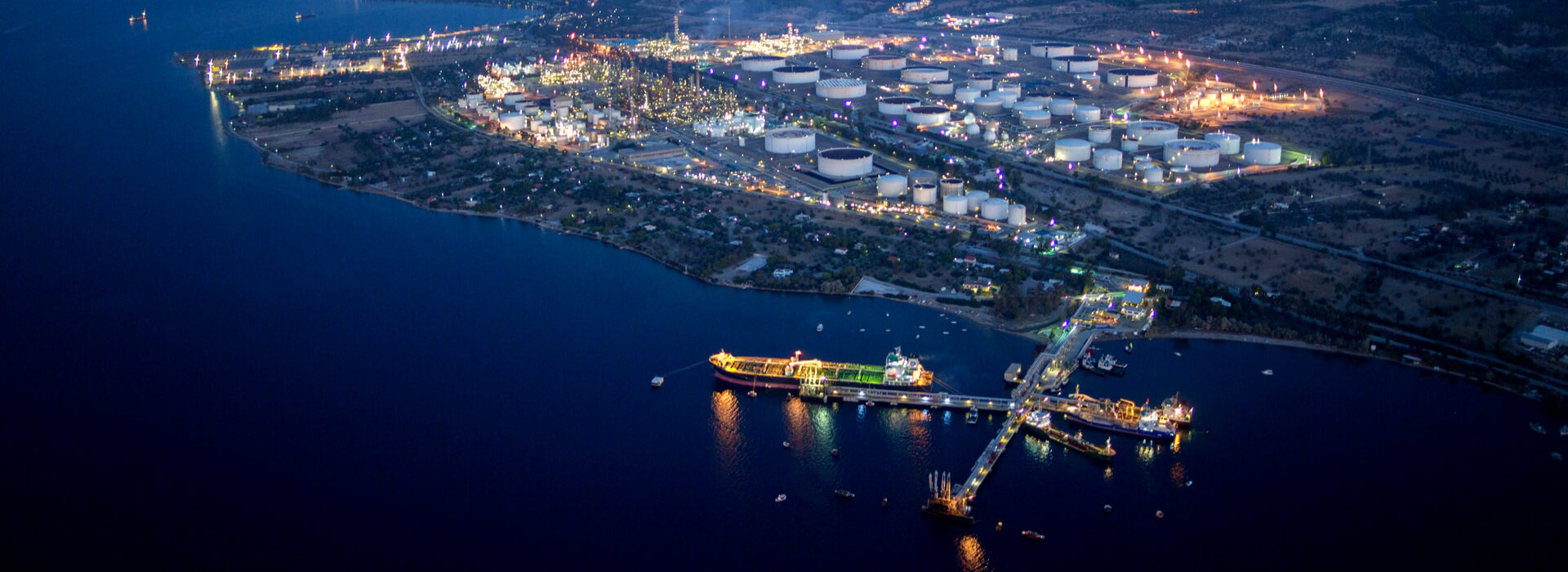The Refinery is located in Agioi Theodoroi, Corinth, about 70 km from the centre of Athens.
The Refinery with its ancillary plants and fuel distribution facilities forms the largest privately owned industrial complex in Greece and is considered one of the most modern refineries in Europe. The complexity of Motor Oil’s refinery stands at 12.61 according to Nelson’s Complexity Index.
It has the capacity to process various types of crude oil and manufactures a wide range of oil products. It supplies retail fuel companies in Greece, but the bulk of its production is sold abroad. Moreover, it is the only refinery that produces base oils in Greece. Refinery products meet the European Union specifications, as well as the most stringent international standards. The technical sophistication of the refinery allows Motor Oil to manufacture products with high added value, adjusting the final product mix to market needs, securing better distribution prices and achieving better refining margins than other complex refineries in the Mediterranean.
Characteristics of the refinery
- Processing capacity: 200,000 barrels of crude oil per stream day (BSD).
- The refinery produces all types of fuel and is one of the most advanced and complex in Europe, with Hydrocracker and Catalytic Cracking units and an 12.61 rating on the Nelson Complexity Index.
- It produces refined fuels (gasoline and automotive diesel) in accordance with the EU specifications.
- It has ISO 9001:2015 certification for Quality, ISO 14001:2015 for the Environment, ISO 45001:2018 certification for Health and Safety, ISO 17025:2005 certification for its Chemical Labs and CE Marking certification for its asphalt products, in accordance with Regulation (EU) No 305/2011 and the requirements of European standard ΕΝ 12591:2009. This is a combination of standards found in very few European refineries. Also, Motor Oil applies the EI/JIG1530 standard in relation to the production, storage and distribution of Jet Fuel. In the context of reducing greenhouse gas emissions and the sustainability criteria laid down by the EU, our company applies a control system for biofuels and the blending of fossil fuels with biofuels, having been certified with the 2BSvs Certificate since October 2016. This certification meets the requirements of the biofuel mass balance . In March 2023 the company has been certified with the ISO 22301:2019 (BCP) standard, which concerns the continuity of the company’s operation from disruptions when they arise. The refinery has earned three new certificates, the ISO 50001:2011 for energy management, the ISO 18788:2015 for its security system as well as the ISO 27001:2013 which concerns the security of information systems .
- It is the only refinery in Greece with a unit producing base oils and finished lubricants, approved by such international agencies as the American Petroleum Institute (API), the European Automobile Manufacturers Association (ACEA) and the United States Army and Navy.
- It includes a Cogeneration Power Plant comprising five gas turbines, where total power production currently reaches 85MW and will increase up to 102MW after the installation of a sixth gas turbine.
- It uses natural gas as a fuel and as a raw material for the production of hydrogen.
- It has a storage capacity of 2,800,000 m3 (Crude Oil: 1,000,000 m3, Intermediate & Finished Products: 1,800,000 m3). It has modern port facilities for tanker docking, suitable for tankers of up to 450,000 tons DWT, which can serve more than 3,000 vessels annually, and Multi Buoy Mooring (MBM) system for crude oil Discharging suitable for tankers of up to 300,000 tons DWT.
- It has a modern truck loading terminal, which can serve 220 tanker trucks per day and significantly strengthens the competitive position of Motor Oil in the southern Greek market.
Refinery Units
Fuels Production: Crude Oil is processed in the Crude Distillation Units ( 200,000 bbl/day total capacity), from which LPG, Naphtha, Kerosene, Diesel and Fuel Oil are produced.
Lpg is routed to the spheres for sell, after removal of sulfur compounds.
Naphtha, Kerosene and Diesel are further treated mainly in order to remove sulfur thus complying with the required specifications and to produce gasoline, jet fuel and diesel fuel respectively (both automotive and heating grades).
Gasoline Production: Naphtha here is treated in order to produce gasoline of a high octane number.
New Naphtha Complex: In 2022, the operation of the New Naphtha Complex was added to the already existing gasoline production units, increasing the Refinery’s production of high-value products such as high-octane gasoline, kerosene and hydrogen. Gasoline production capacity from naphtha increased.
Hydrocracker Complex: This unit is one of the largest investment projects undertaken by the Company the capital expenditure of which amounted to € 350 million completed within 2005. The operation of the Hydrocracker enabled the production of the new clean fuels with low sulfur content according to the specifications of the European Union effective as of 2009 (Auto Oil II). Furthermore, the unit contributed decisively to the improvement of the environmental conditions at the Refinery as the emissions from the FCC were drastically reduced.
FCC Complex: Atmospheric Fuel Oil is fed to the FCC complex to produce LPG, gasoline, diesel, and Fuel Oil. Parts of the LPGs are sent to downstream units and are converted into high quality gasoline components.
Lubes Production: Atmospheric Fuel Oil is also fed to the Lubes Vacuum Unit. After a series of processes in order to improve properties of the lubricants, such as viscosity index, pour point, cloud point, the final grades of base lubes are produced and stored. Additionally, asphalt can be produced from the Lubes vacuum unit which can be sold, or else the bottoms of both vacuum units are routed to the visbreaker for further upgrading and production of fuel oil.


